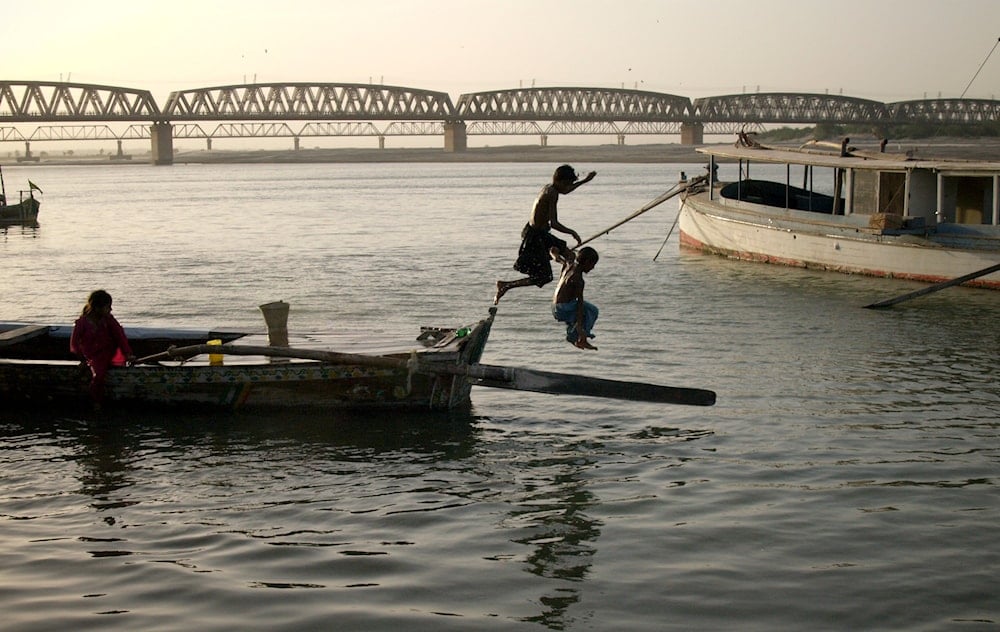India threatens to block water to Pakistan over Kashmir dispute
India suspends the 1960 Indus Waters Treaty with Pakistan after a deadly terror attack in Kashmir, citing cross-border terrorism, threatening vital water resources for millions in Pakistan.
-

Pakistani boys jumps into the Indus river to cool off as temperature rises in Hyderabad, Pakistan on Sunday, May 29, 2011. (AP)
In a major move on Wednesday, India announced the suspension of a decades-old water-sharing agreement with Pakistan following a terror attack in Pahalgam, Kashmir.
For the first time, India has suspended the 1960 Indus Waters Treaty, mediated by the World Bank and crucial for supplying water to 80% of Pakistani farms. India stated that the suspension would remain until Pakistan credibly and irrevocably renounces its support for cross-border terrorism.
India alleged that two of the three militants involved in the attack on tourists, which left 26 men dead in Kashmir, were from Pakistan. Islamabad denied any involvement, warning that any attempt to halt or divert Pakistan’s share of water would be considered an act of war.
"We will ensure no drop of the Indus River's water reaches Pakistan," India's water resources minister Chandrakant Raghunath Paatil said in a post on X.
India could start diverting water within months
Officials and experts from both countries say India cannot immediately halt water flows. The Indus Waters Treaty allows the construction of hydropower plants without major storage or dams on the rivers allocated to Pakistan. However, changes could begin taking shape in the coming months.
Reuters cited two Indian government officials, speaking anonymously due to the sensitivity of the matter, who said India could start diverting water for its own farms using canals within months, while simultaneously planning hydroelectric dams that could take between four and seven years to complete.
India will immediately stop sharing data such as hydrological flows at various sites along the rivers within its territory, withhold flood warnings, and skip annual meetings of the Permanent Indus Commission. This commission is led by an official from each country. According to Reuters, Kushvinder Vohra, a recently retired head of India's Central Water Commission, stated, "They will not have much information with them when the water is coming, how much is coming," adding, "Without the information, they cannot plan."
Vaqar Ahmed, an economist and team lead at UK consulting firm Oxford Policy Management, told Reuters that Pakistan had underestimated the risk of India abandoning the treaty.
"India hasn’t got the kind of immediate infrastructure to halt the waterflows, especially during flood times, so this period creates a crucial window for Pakistan to address the inefficiencies in its water sector," Ahmed said, adding, "There are a lot of inefficiencies, leakages."
Fears grow in Pakistan
In recent years, Indian Prime Minister Narendra Modi’s government has pushed to renegotiate the treaty. Both countries have been working to resolve disputes at the Permanent Court of Arbitration in The Hague over the water storage capacity of the Kishenganga and Ratle hydroelectric plants.
"We can now pursue our projects in free will," Vohra said.
In a letter on Thursday, India informed Pakistan that the circumstances had evolved since the treaty was signed. It cited factors such as rising population levels and increasing demand for cleaner energy sources, particularly hydropower.
A World Bank spokesperson said the organization was a "signatory to the treaty for a limited set of defined tasks" and emphasized that it does "not opine on treaty-related sovereign decisions taken by its member countries."
"If they stop water, all of this will turn into the Thar desert, the whole country," Reuters cited Pakistani farmer Homla Thakur as saying.
Nadeem Shah, a farmer with a 150-acre landholding in Sindh, where he cultivates cotton, sugar cane, wheat, and vegetables, expressed concern not only about irrigation but also about drinking water access. He said that while they place their trust in God, apprehensions regarding India's actions are growing.
Ghasharib Shaokat from Pakistan Agriculture Research, a Karachi-based research firm, stated that India's actions introduce uncertainty "into a system that was never designed for unpredictability."
"At this moment, we don’t have a substitute," he said, adding, "The rivers governed by the treaty support not just crops, but cities, power generation, and millions of livelihoods."
Pakistan's former Foreign Minister Bilawal Bhutto Zardari warned that pulling out of the Indus Waters Treaty would trap future generations in a fresh era of disputes, adding that the region is already bound by long-standing tensions.
"That must not happen," he added.

 4 Min Read
4 Min Read










